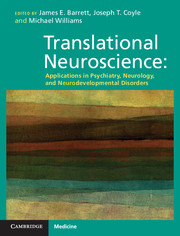Book contents
- Translational Neuroscience:
- Translational Neuroscience:
- Copyright page
- Contents
- Contributors
- Preface
- Acknowledgments
- Chapter 1 The discovery and development of drugs to treat psychiatric disorders: Historical perspective
- Chapter 2 Translational approaches to the treatment of anxiety disorders
- Chapter 3 Mood disorders
- Chapter 4 Schizophrenia
- Chapter 5 Addictive disorders
- Chapter 6 Section summary and perspectives: Translational medicine in psychiatry
- Chapter 7 Historical perspectives on the discovery and development of drugs to treat neurological disorders
- Chapter 8 Alzheimer's disease
- Chapter 9 Pain therapeutics
- Chapter 10 Multiple sclerosis
- Chapter 11 Parkinson's disease
- Chapter 12 Amyotrophic lateral sclerosis
- Chapter 13 Epilepsy
- Chapter 14 Section summary and perspectives: Translational medicine in neurology
- Chapter 15 Historical perspectives on the use of therapeutic agents to treat neurodevelopmental disorders
- Chapter 16 Autism spectrum disorders
- Chapter 17 Attention deficit hyperactivity disorder
- Chapter 18 Epigenetic mechanisms in central nervous system disorders
- Chapter 19 Section summary and perspectives: Neurodevelopmental disorders and regulation of epigenetic changes
- Chapter 20 Promises and challenges of translational research in neuropsychiatry
- Index
Chapter 14 - Section summary and perspectives: Translational medicine in neurology
Published online by Cambridge University Press: 05 July 2012
- Translational Neuroscience:
- Translational Neuroscience:
- Copyright page
- Contents
- Contributors
- Preface
- Acknowledgments
- Chapter 1 The discovery and development of drugs to treat psychiatric disorders: Historical perspective
- Chapter 2 Translational approaches to the treatment of anxiety disorders
- Chapter 3 Mood disorders
- Chapter 4 Schizophrenia
- Chapter 5 Addictive disorders
- Chapter 6 Section summary and perspectives: Translational medicine in psychiatry
- Chapter 7 Historical perspectives on the discovery and development of drugs to treat neurological disorders
- Chapter 8 Alzheimer's disease
- Chapter 9 Pain therapeutics
- Chapter 10 Multiple sclerosis
- Chapter 11 Parkinson's disease
- Chapter 12 Amyotrophic lateral sclerosis
- Chapter 13 Epilepsy
- Chapter 14 Section summary and perspectives: Translational medicine in neurology
- Chapter 15 Historical perspectives on the use of therapeutic agents to treat neurodevelopmental disorders
- Chapter 16 Autism spectrum disorders
- Chapter 17 Attention deficit hyperactivity disorder
- Chapter 18 Epigenetic mechanisms in central nervous system disorders
- Chapter 19 Section summary and perspectives: Neurodevelopmental disorders and regulation of epigenetic changes
- Chapter 20 Promises and challenges of translational research in neuropsychiatry
- Index
Summary
Keywords
Information
- Type
- Chapter
- Information
- Translational NeuroscienceApplications in Psychiatry, Neurology, and Neurodevelopmental Disorders, pp. 253 - 260Publisher: Cambridge University PressPrint publication year: 2012
